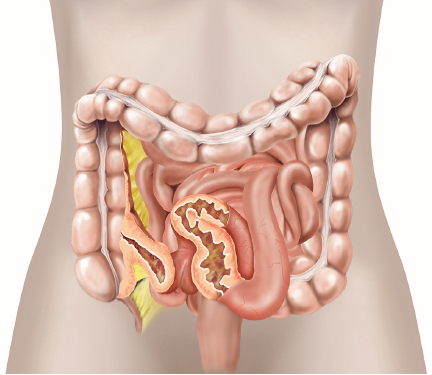What is Crohn's disease?
Crohns disease causes inflammation of your bowel. The disease most often affects the end part of your small bowel (see figure 1). However, it can affect any part of your bowel. Crohns disease causes your bowel wall to thicken, which can block food from passing through. The affected area of your bowel can also fail to absorb nutrients from your food. Left untreated, you can get problems such as abdominal pain, diarrhoea, weight loss, a hole in your bowel, problems with your back passage and fluid leaking out.
What are the benefits of surgery?
Your symptoms should improve. Your doctor may also be able to reduce or stop your medication.
Are there any alternatives to surgery?
Crohns disease can be treated using medication, such as mesalazine, steroids, azathioprine and infliximab. These have side effects and your doctor will discuss them with you.
What does the operation involve?
The operation is performed under a general anaesthetic and usually takes three to four hours.
Your surgeon will make several small cuts in your abdomen. They will insert surgical instruments, alowng with a telescope, inside your abdomen and perform the operation.
Your surgeon will remove the diseased part of your small bowel. They will often need to also remove a part of your large bowel.
Your surgeon will usually join the ends of your bowel back together. If they are unable to join the ends of your bowel, they will make a colostomy or ileostomy.
What complications can happen?
1. General complications
- Pain
- Bleeding
- Infection of the surgical site (wound)
- Unsightly scarring
- Developing a hernia
- Blood clots
- Difficulty passing urine
2. Specific complications
- Damage to structures such as your bowel, bladder or blood vessels
- Developing a hernia near one of the cuts
- Surgical emphysema
- Anastomotic leak
- Continued bowel paralysis
- Damage to other structures inside your abdomen
- Injury to your bowel
- Abnormal joining together of tissue (adhesions)
How soon will I recover?
You should be able to go home after 5 to 10 days. It may take up to three months for you to recover fully. Most people feel much better after the diseased part of their bowel has been removed.
Regular exercise should help you to return to normal activities as soon as possible. Before you start exercising, ask the healthcare team or your GP for advice.
Crohns disease sometimes comes back and affects another part of your bowel.
Summary
Crohns disease causes inflammation of your bowel. Surgery is usually recommended if medication fails to improve your symptoms.
